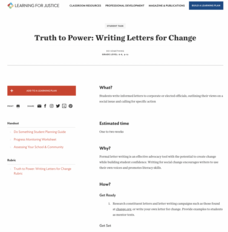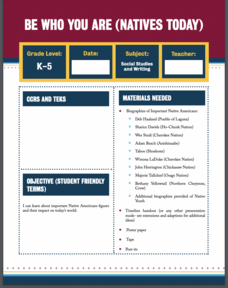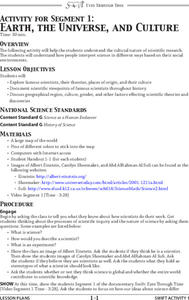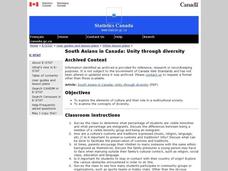Stanford University
Arabian Peninsula
How do cultural differences affect our view of history? The assessment geared towards high school historians, focuses on the credibility of primary sources. Young academics analyze a text and complete short answer questions to...
Teaching Tolerance
Truth to Power: Writing Letters for Change
Can letter writing really create social change? Pupils create and mail formal letters addressing a specific organization to promote social change they wish to see. Class members reflect on the process and responses they received in small...
Museum of Tolerance
The Pursuit of Democracy and Diversity: The Trial of Pro-Social Injustice in Historical Documents and Accounts
Class members investigate The Indian Removal Act of 1830, U.S. Theft of Mexican Territory Timeline, and President Abraham Lincoln’s letter to Horace Greeley, 1862, and then conduct a mock trial of each of these documents to determine...
Facing History and Ourselves
Understanding Identity
Key to social-emotional learning is understanding who we are. The first lesson in an Understanding Identity unit asks class members to consider the factors that shape one's concept of themselves, the parts of their identity they choose...
Humane Education Advocates Reaching Teachers
Justice for All - Educating Youth for Social Responsibility: Grades 6-8
Teach middle schoolers how to develop healthy relationships with activities and lessons designed to create a kind and inclusive
classroom. Pupils create guidelines to develop a safe and civil learning environment. They learn how to...
PBS
Stereotypes vs. Statistics (Grades 4-8)
Stereotypes can be painful if they are used to discriminate against others. Statistics, however, can be helpful in dispelling myths propagated by stereotypes. Using a thoughtful lesson plan, scholars complete graphic organizers...
Teaching Tolerance
Puppet Show
It's a play, it's a story, it's a puppet show! A lively resource provides academics with a creative outlet to express their views on diversity and social justice. Scholars are responsible for writing, creating, and performing a puppet...
Curated OER
I Am Special and You Are Special Too #4
The students listen to a book about being different and investigate that everyone is different, but special in their own unique way. The students draw a picture of themselves using multi-cultural markers. Along with the drawing, the...
Curated OER
Be Who Your Are
An engaging video begins a lesson all about the representation of Native Americans in all types of careers. Following a discussion about the video, scholars participate in a gallery walk showcasing various Native American figures. Pupils...
Curated OER
Earth, the Universe, and Culture
Middle schoolers view segment of documentary, Swift: Eyes Through Time, explore famous scientists, their theories, places of origin, and culture, document scientific viewpoints of famous scientists throughout history, and discuss...
Curated OER
Winter Celebrations
Students draw and label pictures about holiday customs and traditions from their countries.
Curated OER
Indigenous Cultures Change Over Time
Fourth graders research and take notes while viewing a video on the Navajo Indians. In this Indigenous people lesson, 4th graders use the notes they've taken to compare and contrast the Navaho tribe to other Indigenous tribes. Students...
Curated OER
Harlem Renaissance
Middle schoolers discover the Harlem Renaissance. In this early 20th century lesson, students use various primary sources including handouts, worksheets, maps, music, and poetry to examine aspects of African American culture. Middle...
Curated OER
Brief Encounters (Looking at Ourselves and Others)
High schoolers participate in a simulation in which they examine how different cultures interact with one another. In groups, they follow the behaviors for their specific group while a group of observers records their interactions. To...
Curated OER
The Finish Line
Learners investigate the philanthropy of various cultural traditions. In this cultural education instructional activity, students read a handout about Native American, European American, and African American traditions and identify the...
Curated OER
General Spanish Music
Students explore Spanish music. For this cultural traditions lesson, students listen to a brief lecture on Spanish music and then research the regions of Spain to study the cultural diversity there. Students share their findings with...
Curated OER
One Step at a Time
Students investigate the customs and habits of other cultures by reading letters from a Peace Corps Volunteer. In this global customs instructional activity, students discuss how analyzing a culture is similar to analyzing art, no...
Curated OER
South Asians in Canada: Unity through diversity
Ninth graders explore the elements of culture and their role in a multicultural society. In this World History lesson, 9th graders examine the concepts of diversity.
Curated OER
Cultural Exchange (Alaska)
Young scholars explore the culture of Alaska. They identify the geographic location of Tlingit Indians. Students compare/contrast the culture of the Europeans and Tlingits. Young scholars complete selected reading worksheets and provide...
Anti-Defamation League
Dolls Are Us
Representation matters! A lesson examines the looks of dolls and discusses whether the design is inclusive or not. Scholars create a paper doll representing a characteristic about themselves or highlights another diverse quality....
Curated OER
One Step At A Time
Students begin the lesson by discussing how two people watching the same event can see it differently. After viewing an overhead transparency, they report on what they saw after being called upon. They discover that what we see is our...
Curated OER
Confronting the -Isms
Students keep "Mindwatch" diaries to chart their own prejudices and stereotypes. In this social justice lesson, students monitor their own reactions to people who are different from themselves. Students identify and discuss patterns of...
Curated OER
Cultural Connections
Learners explore the concept of philanthropy. In this service learning lesson, students examine the impact of the works of Cesar Chavez, George Washington Carver, Sunderlal Buhuguna, and Abdul Sattar Edhi.
Curated OER
Harvesting the New World: Changing Land Uses and Contact Between Cultures in Colonial Times
Ninth graders differentiate the Native American and European values. In this world history lesson, 9th graders define colonialism in their own words. They study the effects of epidemics and other diseases to Native American populations.

























